

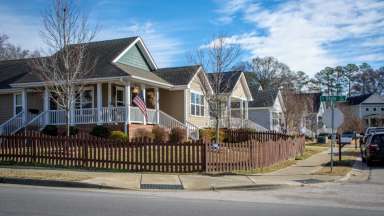
If you lined up every household in the Raleigh area in order from least to most income, the area median income (AMI) is the amount in the middle.
AMI is used to determine eligibility for affordable housing programs. These programs are targeted to households earning below 80% AMI, with some programs intended for lower AMI levels.
We can think of the affordable housing landscape as a continuum that shows the range of affordable housing options available to residents:
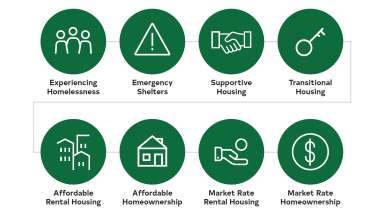
The City's affordable housing programs focus primarily on the development of affordable rental units as well as support for homelessness initiatives and first-time homebuyers with low incomes.
The City works alongside regional partners to address the pressing concern of homelessness. The City partners closely with Wake County, which is the primary funder of emergency shelter and prevention services, and actively participates in the Wake County Continuum of Care (CoC). The CoC is the collective networks, institutions, and organizations that provide housing and services to people who are at risk of or are experiencing homelessness.
The City leverages federal funding to support homelessness initiatives. These programs are outlined below (with homelessness-related services in bold).
ESG: Emergency Solutions Grant
CDBG: Community Development
Block Grant
HOME: HOME Investment
Partnership
Funding from the City's Affordable Housing Bond and American Rescue Plan Act (ARPA) dollars have also been used to support homelessness initiatives. Some examples include:
The construction of affordable rental housing requires capital, just like any other development. However, the rents must be affordable to families earning lower incomes. Affordable units are made accessible primarily through the Housing Choice Voucher Program and the Low-Income Housing Tax Credit (LIHTC).
The Housing Choice Voucher Program is the primary program serving households under 30% AMI. Vouchers are administered locally by Public Housing Authorities.
| Studio | 1BR | 2BR | 3BR | 4BR | |
|---|---|---|---|---|---|
| FMR | $1,213 | $1250 | $1,412 | $1,733 | $2,293 |
LIHTC development is the most widely used tool to create affordable rental units. It subsidizes the acquisition, construction, and rehabilitation of units through financing (debt and/or equity).
It is a multi-year process. It can be challenging for funders to commit dollars to a project until all other funding sources are solidified. The development review process at the local level can be lengthy, with construction or rehabilitation of housing taking 18 months to a year depending on the project size.
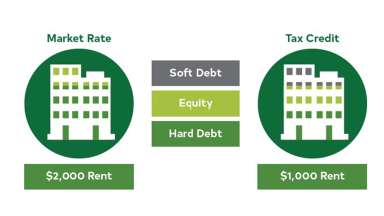
Layered financing through LIHTC equity and soft debt (like low-cost loans) reduce the hard debt, thus allowing monthly charged rents to be lower.
LIHTC is a tightly regulated program with:
The City contributes millions of dollars per year to support the development of affordable rental housing (nearly $17 million is budgeted for FY23-24). As of 2023, the current average subsidy required to create one rental unit affordable at 60% AMI is $159,000.
Developers building market-rate rental housing have more flexibility and higher profit margins than LIHTC developers:
Tools that the City can use to incentivize affordable units in market-rate developments include inclusionary zoning and financial subsidy.
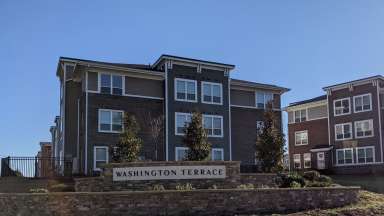
Washington Terrace is an aging 23-acre, 245-unit housing project for households with low incomes. It is in east Raleigh, located in the City's Neighborhood Revitalization Strategy Area. A local nonprofit, DHIC, purchased the property with the assistance of $2.1 million from the City of Raleigh and is redeveloping the entire site in four phases. The first two phases are Villages at Washington Terrace (162 units for families) and Booker Park North (72 units for the elderly).
The City aims to promote affordable homeownership and address the racial homeownership gap (in the Raleigh area, the homeownership rate for white households is 74% vs. 47% for Black households).
Homeownership programs include:
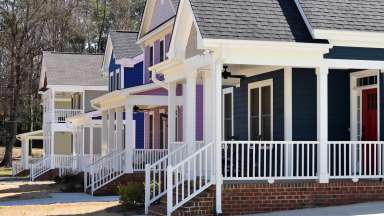
The City partnered with six builders to develop 98 single-family homes in East College Park, which is located less than a mile east of downtown. This mixed-income neighborhood ensures that 60% of homes are affordable to families earning under 80% AMI.
East College Park has been recognized as as strong model of homeownership in North Carolina, and received the 2022 Home Ownership Development Award from the North Carolina Housing Finance Agency.
Housing and Neighborhoods
One City Plaza
421 Fayetteville St. 12th Floor, Suite 1200
Raleigh, NC